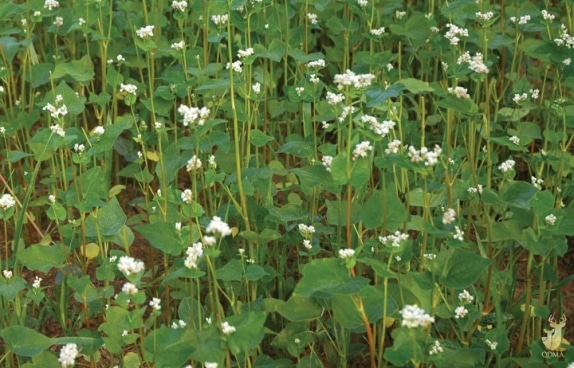Yes, deer eat buckwheat. Buckwheat is a type of grain that is commonly used in bird seed mixes. It is also a popular food for deer.
Buckwheat is high in protein and carbohydrates, which makes it a good food source for deer.
If you’re like most people, you probably think of deer as gentle forest creatures that nibble on dandelions and drink from clear brooks. But did you know that deer will also eat buckwheat?
Buckwheat is a type of grain that is often used in animal feed.
It’s high in protein and fiber, which makes it a good food source for deer. In fact, deer love buckwheat so much that they will often strip the plants of all their leaves in order to get to the grains.
While this may seem like a lot of work for such a small food source, bucks actually need the extra calories that buckwheat provides during the fall mating season.
So if you see some bald-looking buckwheat plants in your neighborhood, now you know why!
How Much Buckwheat Per Acre
Buckwheat is a versatile crop that can be grown for both human and animal consumption. The grain is high in fiber and protein, making it a nutritious addition to any diet. When deciding how much buckwheat to plant per acre, consider the following:
-The intended use of the crop. If you plan to harvest the grain for yourself, you’ll need to plant more than if you’re growing it solely for livestock feed.
-The climate in your area.
Buckwheat thrives in warm weather, so if you live in a cooler climate, you may need to plant less to avoid disappointment.
-The soil type on your property. Buckwheat does best in well-drained soils with moderate fertility.
If your soil is poor or overly dry/wet, you may need to adjust your planting rate accordingly.

Credit: deerassociation.com
What Can I Plant With Buckwheat for Deer?
There are a few things to consider when planting buckwheat for deer. The first is the time of year. Buckwheat is a warm-season annual, so it should be planted in late spring or early summer.
The second is the soil type. Buckwheat prefers well-drained soils with a pH of 6.0-7.5. It also does not tolerate drought or flooding very well.
Finally, you need to decide what other plants you want to include in your plot. Some good options for plants that can be planted with buckwheat are soybeans, cowpeas, and sunflowers.
What Animal Eats Buckwheat?
Buckwheat is a plant that is related to rhubarb and sorrel. It is a short-season crop that does not tolerate frost. Buckwheat is grown for its grain-like seeds, which are used for flour, cereals, and animal feed.
The plant has small green flowers that turn brown when they mature.
What Animals Eat Buckwheat Seeds?
Buckwheat is a plant that is related to rhubarb and sorrel. It is a short-lived perennial plant with triangular seeds. The plant grows in warm, temperate and subtropical regions of the world.
Buckwheat is often used as a cover crop or green manure. It can also be used for human food, animal feed, and as a source of honey.
The buckwheat plant produces small black seeds that are about the size of a poppy seed.
These seeds are high in protein and essential amino acids. They are also a good source of fiber and minerals such as magnesium, phosphorus, iron, and zinc. Buckwheat seeds can be eaten raw, roasted, ground into flour, or cooked like rice.
Buckwheat plants are attractive to many animals because they produce a lot of seeds. Birds such as quail, doves, sparrows, finches, juncos, and towhees eat the seeds. Small mammals such as mice, voles, squirrels, chipmunks, rabbits, and deer also eat the seeds.
Does Buckwheat Come Back Every Year?
Buckwheat is an annual plant, meaning it completes its life cycle in one growing season and then dies. The plant produces flowers and seeds during the summer, which are then harvested in the fall. Buckwheat does not come back every year, but it can be planted again the following spring to produce another crop.
Buckwheat Food Plots For Deer
Conclusion
It’s a common question asked by many gardeners, do deer eat buckwheat? The answer is yes, deer will eat buckwheat if they are hungry enough. However, there are some things to consider before planting buckwheat in your garden.
Buckwheat is a high protein food source that is popular with deer. If you live in an area where deer are prevalent, they will likely find and eat your buckwheat plants. While this may not be ideal for the gardener, it is important to remember that deer are wild animals and their main priority is finding food.
If you choose to plant buckwheat in your garden, be prepared for the possibility that deer will eat it.
There are a few ways to deter deer from eating your buckwheat plants. One method is to plant other crops around the perimeter of your garden so that the deer have other food options available.
Another method is to use fencing or netting around the garden to keep the deer out. Whatever method you choose, be sure to take action before the deer discover and destroy your hard work!
